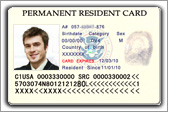Immigration News & Updates eNewsletter
eNewsletter
POSTING DATE: FEBRUARY 8, 2016
Learn More About:
Immigration News & Updates eNewsletter © 2011 - 2016
For questions about U.S. Residency, Green Cards and Immigration Visas, Visit our Website at: www.ImmigrateToday.com or call our office at: (954) 382-5378
Check Out This Cool Stuff For Immigrants....
Immigration
Questions & Answers
Question:I have a question about sponsoring my new wife for her Green Card. About 3 years ago, I got my Green Card through my previous marriage to a U.S. Citizen wife. About a year after I got my Green Card, I joined the military and was able to obtain expedited Citizenship. After that, my ex wife and I divorced. I met my new wife while stationed overseas and I want to sponsor her for her Residency. Can I petition for her now since I am a U.S. Citizen?
Answer: Under Immigration regulations, Immigrants who obtained residency through marriage, whether currently a Resident or Citizen, who seek to sponsor a new spouse for Residency within a five year period after obtaining Residency, are required to prove that the initial marriage through which they gain Residency was real (also called “bona fide”). If the marriage with your ex-wife was real and you have extensive documentation to prove it, then a qualified Immigration attorney can assist you in sponsoring your new spouse. The problem arises when the sponsoring spouse files a spousal petition within the five year period and is then unable to provide adequate documentation to prove that the past marriage was real. The key is to either make sure you are fully prepared, or wait until the five years have elapsed.
This Week's Immigration News
New Visa Requirement For Caribbean Agricultural Workers
The Department of State recently increased Visa requirements for Caribbean residents coming to the U.S. as H2A Agricultural Workers.
Beginning February19th, H2A Agricultural Workers from the Caribbean will be required to have both a Valid Passport and Visa to ensure sufficient security screening prior to Visa issuance.
Helpful Immigration Hints You Can Use
Immigration How To:
How Do I Send My Immigration Application To The USCIS?
Question: Good day, I am a permanent resident planning on applying for my citizenship next month. I also plan to file for my parents and my little brother to migrate here. Should I apply for my parents and brother now as a permanent resident and will their residency come through as soon as I get the citizenship (I mean they will need me to be a citizen before they approve the I-130) or should I wait for the citizenship before I file?
Answer: As long as you are age 21 or older, once you obtain your U.S. Citizenship, you can sponsor your parents (each one separately) for their U.S. Residency. You cannot apply for them while you are a U.S. Resident, even if you have filed the Naturalization application – if you do, the case will be denied.
Under current law, unfortunately, your younger brother cannot immigrate along with either parent as a “dependent”. Instead, you can sponsor your parents and then once they obtain their U.S. Residency in about a year, one of them can file for your brother. If he is still a minor, it could take up to 1 1/2 years for an Immigrant Visa to be available to him in the F2A category for minor children of U.S. Residents. Also, if your brother has a tourist visa, once the I-130 is filed for him, he may be able to come to the U.S. and later file for his adjustment, if the Visa Bulletin indicates availability. In such cases, it can be a little complicated and it is best to consult with an Immigration Attorney prior to any I-485 adjustment of status filings, to ensure eligibility.
You can find get more information about documentation requirements to prove the relationship between the father and child to ensure approval by visiting our website at:www.Immigratetoday.com or by calling our office at: 954-382-5378.
USCIS Provides Residency Extension “Stickers”
To Green Card Renewal Applicants
The extension stickers are valid for nine (9) months. Residents who have already attended their Biometrics appointment and did not request or receive the extension sticker can make an INFOPASS appointment to return to the local USCIS office and receive the extension sticker at that time.
Make an Infopass Appointment at your local USCIS office:
Current USCIS processing times for Green Card renewal applications (Form I-90), can exceed 6-8 months, often causing problems for Residents who require proof of legal immigration status for Driver’s License and other renewals. As a result of these long delays, local Field Offices are authorized to provide Residents with a Green Card extension sticker, affixed to their expired cards, to provide proof of their continuing legal Residency status in the U.S..
Under this policy, USCIS personnel at USCIS Field Office Application Support Centers can provide extension stickers to Residents at the time of their Biometrics appointment.
Send USCIS Applications and Correspondence by U.S. Express Mail For Easy Tracking and Delivery Confirmation
Immigration applications and any follow-up correspondence with the USCIS are such important matters, that you should take the additional step of sending these documents to the USCIS by a safe, quick method, which allows you to verify the date and time of delivery to the USCIS.
This is especially critical when you have received a Request For Additional Evidence from the USCIS and must provide the requested documentation by a specified deadline.
Many applicants do not know that if the response sent to the USCIS is postmarked before the deadline date, but is actually delivered and received by the USCIS after that date, the case is likely to be denied.
Not only is this a tragedy for the beneficiary of the immigration application, but in such instances, all the USCIS filing fees are lost, which in some cases can be thousands of dollars. Certified Mail is not delivered quickly and other private courier services like Fed-ex cannot be delivered to the regular USCIS P.O. box address.
So, since the USCIS is a government agency, like the U.S. Priority Express Mail (U.S. Postal Service), the safest way to send applications/documents and to safeguard against the unfortunate situation above, is to use the U.S. Priority Express Mail next day service. The cost is about $15.00 and well worth it. You will receive a tracking# so you can go online and confirm delivery. Be sure to send any responses requested by the USCIS at least one week or more before the deadline. Also, make a copy of everything you send to the USCIS including the initial application, supporting documents, Money Order and all follow-up responses before sending to the USCIS and never send originals! Good luck!
The new requirements apply to H2A spouses and children as well. This policy change applies to a British, French, or Netherlands national, or a national of Barbados, Grenada, Jamaica, or Trinidad and Tobago, who have residence in British, French, or Netherlands territory located in the adjacent islands of the Caribbean, or Barbados, Grenada, Jamaica, or Trinidad and Tobago.
Question:My question is about getting my U.S. Residency back. I was married before to an American in 1995 and got my Green Card, then we separated in 2005 and divorced. I moved back to the U.K. and have lived here ever since. In order to be able to travel back and forth to the U.S. for vacation, I handed in my Green Card at the Embassy in 2007. But now my American daughter will be going to college soon and I plan to move back to the states to spend more time with her. My questions is, how to go about getting my old Green Card back?
Answer: That’s a great question. Once a U.S. Resident formally “relinquishes” (gives back) a Green Card at a U.S. Embassy or Consulate, the officer usually requires that State Department form I-407 be signed, abandoning all rights to Residency. When this is done, all U.S. Residency status is lost and any desire to obtain Residency again requires a whole new application process. However, in order to qualify for U.S. Residency again, the immigrant must still have a legal basis for eligibility, for instance, being married to a U.S. Citizen, or being sponsored by a U.S. Citizen child, parent or sibling, since there is no way to apply solely on the basis of requesting the old Green Card status again.
There are instances where individuals have formally surrendered their Green Card at a U.S. Consulate, then later applied for a new one in the U.S. by filing the I-90 application for a replacement Green Card and were successful in obtaining their Green Card again. However, this is not in accordance with immigration regulations and can be tricky and potentially problematic when re-entering the U.S. from travel abroad and when applying for Naturalization in the future. The main problem arises when the applicant has obtained a U.S. Tourist Visa in order to re-enter the U.S. to apply for the Green Card replacement, since the USCIS can easily see the non-immigrant visa in the Passport. Obtaining a non-immigrant visa once an immigrant has U.S. Residency can itself result in a technical abandonment of Residency.
In your case, since you are no longer married to a U.S. Citizen, you would need to have some other eligibility in order to apply for U.S. Residency again. Once your U.S. Citizen daughter turns age 21, she can sponsor you for your residency. Let me know how old she is and we will take it from there.











